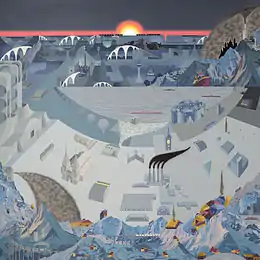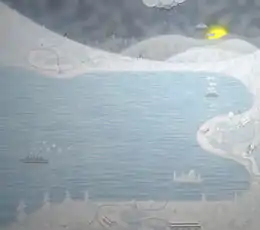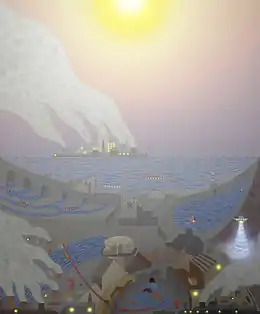Matthias A. K. Zimmermann
Matthias Alexander Kristian Zimmermann (* 6 May 1981 in Basel) is a writer, painter and new media artist from Switzerland.

Acrylic on canvas, 160 × 160 cm (63 in × 63 in)
Museum of Art Aarau, Switzerland

Acrylic on canvas, 100 × 280 cm (39.4 x 110 in)
Computer Museum Kiel, Germany

Acrylic on canvas, 100 × 205 cm (39.4 in × 80.7 in)
Museums Quarter, St. Annen-Museum, Germany

Acrylic on canvas, 160 × 180 cm (63 in × 70.9 in)
Ludwig Museum of Art

Acrylic on canvas, 140 × 170 cm (55.1 in × 67 in)
Ludwig Museum of Art
Matthias A. K. Zimmermann | |
|---|---|
 | |
| Born | Matthias Alexander Kristian Zimmermann 6 May 1981 Basel, Switzerland |
| Nationality | Switzerland |
| Education | University of Fine art, University of education |
| Known for | Writer, Painting, New media art, Video game art |
Biography
Matthias A. K. Zimmermann was born in Basel and grew up in the canton of Aargau. He studied music/composition at the University of Arts Berne, fine art at the Lucerne University of Applied Sciences and Arts, game design and art education at the Zurich University of Applied Sciences and didactics/pedagogy at the Swiss Federal Institute for Vocational Education and Training (SFIVET). His artistic work has found a reception in international exhibitions as well as in scientific and essayistic texts. Zimmermann's artworks are in collections of various museums.[1] His debut novel, CRYONIUM, has been published by Kulturverlag Kadmos (Kadmos Publisher).[2]
Work
Literary work
- CRYONIUM. The Experiments of Memory. Novel. Kulturverlag Kadmos (Kadmos Publisher), Berlin 2019, ISBN 978-3-86599-444-8.[3]
Content, concept and execution
Zimmermann's artistic works, which he refers to as "Model Worlds", contain a smorgasbord of visual languages borrowed from digital space, the vocabulary of different cultures, and the history of art, design, and media. Computer game elements, source codes, japanese gardens, Buddhist symbolism, and icon paintings from the Middle Ages can be found predominantly. The pictorial motifs show landscapes in varying degrees of abstraction. This ranges from photorealistic, clearly recognizable places to spatial entities. The pictorial motifs convey both cheerful and gloomy atmospheres that paraphrase utopian and dystopian scenarios. The staging of the pictorial space using things from different times and places illustrates the simultaneity of virtual distance resolution. The geometric frameworks of the pictorial contents result from the most Miscellaneous perspectives and spatial representations. Each picture is based on a system that is constructed like a construction kit or puzzle and illustrates the playful concept of modularity – the variable combination, transformation, and ever new composition. The "Model Worlds" are designed as paintings on canvas or digitally constructed on the computer and implemented as Diasec. Each painting is preceded by meticulous sketch studies that last for months or years. Zimmermann's creative process reflects the interface of the analog and digital. His painting technique adapts the aesthetics of computer images, whereas his digitally created pictures mostly refer to motifs of classical painting.[4][5]
Artistic Research
The art book Digital Modernity (Hirmer Publishers), published in 2018, discusses Zimmermann's work primarily under the aspect of artistic research. By combining elements of aesthetic mediation with those of the knowledge system, new epistemological spaces are opened up for the reception of art. The "Model Worlds" form a topology through space and time, research in the history of art, design and media, and point out technical connections.[6] The series of pictures, The Space Machine, layers the picture content in six levels – energy, hardware, binary code, 3D graphics software, game world (electronic visual display), source codes – and illustrates the construction of digital worlds. Among other things, the source codes shown have the function of source references.[7]
Museums
Exhibitions
- Museum of Art Aarau, Switzerland: Selection 11, 2011
- Art Museum of Lucerne, Switzerland: Annual Exhibition, 2011
- Computer Games Museum Berlin, Germany: Model Worlds – Pictures by Matthias Zimmermann, 2013[8]
- Computer Games Museum Berlin/Institution of Digital Culture, Germany: Supersample – Pixels at an Exhibition, 2015[9]
- Museet for Religiøs Kunst, Denmark: Vokseværk, 2015
- St. Anne's Museum Quarter, Lübeck/Landeshaus Kiel, Germany: KunSt aktuell im LandesHaus, 2015
- Ludwig Museum of Art, Germany: Matthias Zimmermann – From Videogame towards the Apocalypse, 2016[10]
- Ludwig Museum of Art, Germany: The Known and the Unknown, 2019[11]
- Museum of Art Aarau, Switzerland: Selection 19, 2019
Inventory
Artwork by Matthias A. K. Zimmermann are in the permanent collection of the following museums and cultural institutions
- Technisches Museum Wien, Vienna, Austria
- Odysseum – Science Center, Germany
- Ludwig Museum of Art, Germany
- Museum of Art Aarau, Switzerland
- Buchheim Museum of Fantasy, Germany
- Tucson Museum of Art and Historic Block, USA
- MoFA – Florida State University / Museum of Fine Arts, USA
- St. Anne's Museum Quarter, Lübeck, Germany
- Museum für Kommunikation Frankfurt, Germany
- Museum of Art Göppingen, Germany
- Computer Museum Kiel, Germany
- Computer Games Museum Berlin, Germany
- Toy Museum, Germany
- Museum of Contemporary Art – Collection Hurrle, Germany
- Museet for Religiøs Kunst, Denmark
- Department of Music, University of Innsbruck[12]
_Ausstellung_9.JPG.webp) Museum of Art Aarau
Museum of Art Aarau

_Ausstellung_Kunstmuseum.JPG.webp) Art Museum of Lucerne
Art Museum of Lucerne
Literature
- Natascha Adamowsky (ed.): Digital Modernity. The Model Worlds by Matthias Zimmermann. Hirmer Publishers, Munich 2018, ISBN 978-3-7774-2388-3[13]
- Mark R. Hesslinger / Beate Reifenscheid (ed.): Reality and the Divine – From the Deutschherrenhaus to the Ludwig Museum 1216 – 2016, Ludwig Museum, Koblenz 2016, ISBN 978-3-9816878-2-8
- Christian Huberts, Sebastian Standke (Hrsg.): Between|Worlds: Atmospheres in the Computer Game. Werner Hülsbusch, Glückstadt 2014, ISBN 978-3-86488-063-6
- Dagmar Fenner (Hrsg.): What can and may art do? An ethical outline. Campus Publishers, Frankfurt a. M. 2013, ISBN 978-3-59339-871-6
Publications about Matthias A. K. Zimmermann (selection)
- ARD (broadcaster)/Reload, Television publication: Video game art, 7 October 2014[14]
- University of Heidelberg/Publicationsplattform Art History, René Stettler: Various scientific essays.[15]
- Berliner Gazette – Culture, Politics and Digital: Various authors.[16]
- Language at Play – Scientific magazine, Christian Huberts: The re-medialization of procedural atmosphere into static paintings[17]
- Neue Zürcher Zeitung, Gerhard Mack: Digital world – painters use virtual space [18]
- Basler Zeitung, Graziella Kuhn: Pixel auf Leinwand[19]
- Luzerner Zeitung, Urs Bugmann: A World of Extreme Artificiality[20]
- Luzerner Zeitung, Urs Bugmann: Pictures, perfect like from the computer game[21]
- 20 Minuten, Jan Graber: When "Mario" and "Tetris" are hanging in the museum[22]
- Winzavod, Moscow: «Модельные миры»_Маттиас Циммерманн[23]
- The Village, Moscow: В галерее «11.12» открывается выставка Маттиаса Циммермана[24]
- Swiss Embassy in Moscow: Moscow. Matthias Zimmermann at Winzavod[25]
- EA Blog for digital game culture, Martin Lorber: Game Art – Art and digital games: The space machine by Matthias A. K. Zimmermann [26]
- GamesArt, Davis Schrapel: Miscellaneous articles [27]
References
- Page 312 (Chapter: The artist) in: Natascha Adamowsky (Hrsg.): Digitale Moderne. Die Modellwelten von Matthias Zimmermann. Hirmer Publishers, Munich 2018, ISBN 978-3-7774-2388-3.
- German National Library – Matthias A. K. Zimmermann, Writer, Novel
- Kulturverlag Kadmos (Kadmos Publisher) Berlin: Matthias A. K. Zimmermann: CRYONIUM. The Experiments of Memory. Novel. ISBN 978-3-86599-444-8.
- Page 354 – 259 (Chapter: Creation process) in: Natascha Adamowsky (Hrsg.): Digitale Moderne. Die Modellwelten von Matthias Zimmermann. Hirmer Publishers, Munich 2018, ISBN 978-3-7774-2388-3.
- Page 74, 75 (Chapter: Model Worlds) in: Natascha Adamowsky (Hrsg.): Digitale Moderne. Die Modellwelten von Matthias Zimmermann. Hirmer Publishers, Munich 2018, ISBN 978-3-7774-2388-3.
- Page 22 – 27 (Chapter: Digital Modernity) in: Natascha Adamowsky (Hrsg.): Digitale Moderne. Die Modellwelten von Matthias Zimmermann. Hirmer Publishers, Munich 2018, ISBN 978-3-7774-2388-3.
- Page 129 – 131 (Chapter: The Space Machine) in: Natascha Adamowsky (Hrsg.): Digitale Moderne. Die Modellwelten von Matthias Zimmermann. Hirmer Publishers, Munich 2018, ISBN 978-3-7774-2388-3.
- Press release, Computer Games Museum Berlin – direct link
- Artists, Supersample – Pixels at an Exhibition, 2015 – direct link
- Ludwig Museum: Matthias Zimmermann – Vom Video Game zur Apokalypse
- Ludwig Museum: The Known and the Unknown
- Music and images – Database, Department of Music, University of Innsbruck
- Hirmer Publishers
- Reload: „Videospielekunst“, ARD, Einsplus, 7 October 2014 – direct link )
- Universität Heidelberg/Publikationsplattform Kunstgeschichte, René Stettler: Miscellaneous wissenschaftliche Essays.
- Matthias A. K. Zimmermann, Berliner Gazette
- Language at Play – Wissenschaftsmagazin, Christian Huberts: Die Remedialisierung prozeduraler Atmosphäre zu statischen Gemälden
- Neue Zürcher Zeitung, Gerhard Mack: Digitale Welt – Maler nutzen den virtuellen Raum
- Basler Zeitung, Graziella Kuhn: Pixel auf Leinwand
- Neue Luzerner Zeitung, Urs Bugmann: Eine Welt in extremer Künstlichkeit
- Neue Luzerner Zeitung, Urs Bugmann: Bilder, perfekt wie aus dem Computerspiel
- 20 Minuten, Jan Graber: Wenn «Mario» und «Tetris» im Museum hängen
- Winzavod, Moscow: «Модельные миры»_Маттиас Циммерманн
- The Village, Moscow: В галерее «11.12» открывается выставка Маттиаса Циммермана
- Schweizer Botschaft in Moskau: Moscow. Matthias Zimmermann at Winzavod
- EA Blog für digitale Spielkultur, Martin Lorber: Game Art – Kunst und digitale Spiele: Die Raummaschine von Matthias A. K. Zimmermann
- GamesArt, Davis Schrapel: Miscellaneous Artikel
External links
| Wikimedia Commons has media related to Matthias A. K. Zimmermann. |
- Official website
- Literature by and about Matthias A. K. Zimmermann in the German National Library catalogue
- "Matthias A. K. Zimmermann". SIKART Lexicon on art in Switzerland.
- documenta archiv, Kassel: Matthias A. K. Zimmermann
- artlog.net: Matthias A. K. Zimmermann
- Institute for Musicology at the University of Innsbruck. Music after pictures. Composer database: Matthias A. K. Zimmermann
- arthistoricum.net: ART-Dok, Publication platform for art and visual sciences. University of Heidelberg, Matthias A. K. Zimmermann 2012
- arthistoricum.net: ART-Dok, Publication platform for art and visual sciences. University of Heidelberg, Matthias A. K. Zimmermann, 2014
- OPAC. Institute for Modern Art Nuremberg: Matthias A. K. Zimmermann
- European-art.net: Matthias A. K. Zimmermann